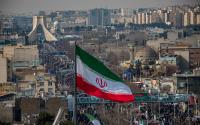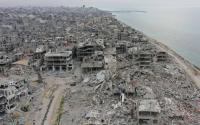Violence continued in the Occupied Territories on Thursday, two days after the Israeli military raided the main prison in the West Bank city of Jericho, seizing five Palestinians accused of assassinating former Israeli Tourism Minister Rehavam Zeevi. Palestinian President Mahmoud Abbas called the raid "an unforgivable crime" and a humiliation to the Palestinian people. We speak with University of Massachusetts Dartmouth professor Naseer Aruri.An Israeli soldier was killed in a fierce gun battle in the West Bank city of Jenin Thursday during a raid by Israeli forces. The raid came hours after gunmen shot and wounded two Israeli motorists near a Jewish settlement.
The spike in violence followed Tuesday's assault on a prison in Jericho by Israeli forces. In the raid, Israeli troops seized five Palestinians accused of assassinating former Israeli Tourism Minister Rehavam Zeevi. Israel used helicopters and tanks to fire at the prison before smashing through its walls with armed bulldozers. Two Palestinians were killed during the assault and a third has since died of his injuries.
Palestinian President Mahmoud Abbas angrily denounced the raid on Wednesday. Speaking at the destroyed jail, Abbas called the attack, "An ugly crime which cannot be forgiven and a humiliation for the Palestinian people." Abbas also said the raid had only been carried out to boost the Israeli government's chances in the coming elections.
Meanwhile, Palestinians across Gaza and the West Bank have gone on strike over Israel's seizure of militant Ahmed Saadat, the leader of the Popular Front for the Liberation of Palestine and four others. Acting Prime Minister Ehud Olmert defended the move saying, "We are proud that we have imposed justice on these killers without hurting unfairly any other person who was not involved,"
The five had been in the prison under guard from British and US jailers. But early Tuesday, the British government removed the supervisors, citing security reasons. The Israeli government said it raided the prison to prevent a Hamas government from carrying out a promise to release the prisoners.
Many Palestinians are accusing the British and U.S. governments of colluding with Israel in the raid. President Abbas also questioned how Israeli forces had known so precisely when to start their attack, just minutes after the international monitors were withdrawn. The British government has denied any collusion.
Following the raid, armed Palestinians kidnapped at least eleven foreigners in the West Bank and Gaza. All of the hostages have since been released.
Naseer Aruri, Professor Emeritus of Political Science at the University of Massachusetts at Dartmouth. He is author of the book "Dishonest broker: America's Role in Israel and Palestine." His forthcoming book is titled "Palestine and the Palestinians."RUSH TRANSCRIPT
AMY GOODMAN: For more on the latest, we're joined on the telephone right now by Naseer Aruri, Professor Emeritus of Political Science at the University of Massachusetts, Dartmouth. He's author of the book, Dishonest Broker: America's Role in Israel and Palestine. His forthcoming book is Palestine and the Palestinians. Professor Aruri, welcome to Democracy Now!
NASEER ARURI: Thank you, Amy.
AMY GOODMAN: Your response to what has taken place over the last few days in Jericho?
NASEER ARURI: Well, I think that here we see that a series of mistakes and illegalities have been committed. I mean, to begin with Ahmed Saadat, the new head of the Palestine -- the Popular Front for the Liberation of Palestine, he and his colleagues were actually sentenced illegally four years ago by a military court headed by Arafat, somebody from the Arafat dynasty who has no training in the law whatsoever. Then, they were held illegally by virtue a political arrangement, an extra-legal arrangement, as Amnesty calls it, by the British, the U.S., as well as the P.A. and Israel. And now they are kidnapped and incarcerated in Israel proper illegally, since the occupying power does not really have the right to remove people under its occupation to its own territory and put them on trial.
And this is a violation of international law. I mean, these people are actually or virtually political prisoners. There's not much that is being discussed about the legality of it. And the fact that this could have been an election stunt, I think, is almost self-explanatory. I mean, Olmert has succeeded Sharon, and he is demonstrating a muscular policy, even though the Jericho prison is not Iran, but I guess it is his way of telling the Likud Party that he is capable of decisive action, and here we did it. We got them, as headlines appeared in the Israeli press.
JUAN GONZALEZ: And, Professor Aruri, your sense of the impact across the rest of the Arab world, not only of the raid, but then of these images, photographs of other Palestinian prisoners being stripped to their underwear, that was in many of the press around the world?
NASEER ARURI: Well, it's a very humiliating thing for the Arab world, even though the Arab world has been really reticent about the events that have taken place over the past few years. I mean, Israel is treating the Palestine Authority and Arabs as irrelevant, with contempt. Everything is unilateral. The agreements are unilateral. Formal agreements that's have been signed since Oslo are being sidelined. The Arab press actually yesterday was filled with editorials and commentaries about the prison storming and emphasizing the fact that Israel has no regard whatsoever for agreements since Oslo, that this is a blow to our past, and that when it comes to international law, there is absolute irrelevance, and Israel treats international law with contempt and irrelevance. So there is really a storm across the Arab world. As to whether this will dissipate or whether it will have an impact, I think it remains to be seen.
AMY GOODMAN: We're talking to Naseer Aruri, Professor Emeritus of Political Science at the University of Massachusetts at Dartmouth, author of Dishonest Broker: America's Role in Israel and Palestine. Saadat was send to Jericho in 2002 under an internationally brokered deal that ended the Israeli siege that year of the late Palestinian leader Yasser Arafat's compound at Ramallah. Can you talk about that and what this means in relation to that international agreement?
NASEER ARURI: Well, actually, Ehud Olmert, I think, used international agreement. I think it's hardly an international agreement. The story begins, actually, with the assassination of Abu Ali Mustafa, which somehow nobody seems to talk about. Abu Ali Mustafa was the top leader of the PFLP. He was sitting in his office in Ramallah, and suddenly he was hit by a missile that was fired from a helicopter, and he was shredded to pieces. Naturally, the PFLP retaliated by assassinating a Minister of Tourism in Israel, Rechavam Ze'evy, who was an advocate of ethnic cleansing of the Palestinians. He made no point to hide it, and he was known to be an advocate of ethnic cleansing.
So now, the Israelis would be holding Saadat as responsible, since he became the new head of the PFLP. And Saadat took refuge in Arafat's office in Ramallah. The Israelis come and they besiege Arafat's office, and that so-called international agreement is forged, whereby Arafat would save his skin by basically sacrificing Saadat and his colleagues and acquiescing in an agreement that was brokered by the U.S. and the U.K. and Israel and the P.A., so you have four partners here, four parties to it, whereby Saadat and his colleagues were sent to Jericho under the jurisdiction of the Palestine Authority, but under the supervision of Britain and the U.S. So you have U.S. and British monitors guarding the prison.
And, as we heard, these people decide to leave on Tuesday morning. And minutes after that, Israel storms the compound. So this is really an illegal agreement. I mean, it's not an international agreement. It's an agreement that was imposed on the weak P.A. They had no choice. And, as I said, Arafat was trying to basically save his own skin, and he succeeded in doing that, by having acquiesced really in an arrangement that's an extra-legal arrangement and sending them. I think I should mention here --
AMY GOODMAN: We just have 20 seconds.
NASEER ARURI: Okay. I should mention here that highest court of justice in the P.A. ordered the release of these people, and they were never released, by the way.
AMY GOODMAN: Naseer Aruri, Professor Emeritus of Political Science at the University of Massachusetts, Dartmouth. Thank you very much for joining us.






